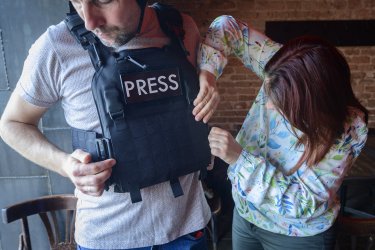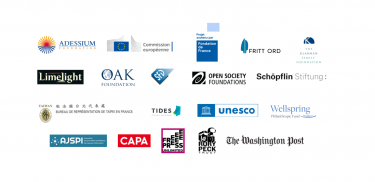Protective equipment, training and funding – RSF helps journalists in Ukraine

For the past six months, Reporters Without Borders (RSF) has accompanied and assisted more than 600 journalists covering the war in Ukraine, providing security equipment, financial and psychological assistance, and training in first aid and physical and psychological safety via the Press Freedom Centre it has created in Lviv and Kyiv.
Read in Ukrainian / Читати українською
Read in Russian / Читать на русском
The war that Russia launched against Ukraine on 24 February 2022 is also a full-blown “information war.” Ukrainian journalists have had to transform themselves into war reporters, while journalists from all over the world have gone to Ukraine, with the result that around 9,000 Ukrainian and foreign reporters are now accredited with the Ukrainian authorities as journalists covering this war.
Eight reporters have been killed and 16 have been injured in the course of their work in Ukraine during the past six months. They include the Ukrainian photojournalist Maks Levin and the French video reporter Frédéric Leclerc-Imhoff, who gave their lives to cover the war. As well as filing legal complaints and taking other judicial initiatives with the aim of defending the victims of war crimes, RSF has undertaken a range of activities to assist journalists in the field and improve their safety. As of 1 August, more than 600 Ukrainian and foreign reporters had benefitted.
Press Freedom Centre in Lviv and Kyiv has lent protective equipment to 224 journalists

Two weeks after Russia launched its invasion of Ukraine, RSF opened a Press Freedom Centre within the Ukraine Media Centre in the western city of Lviv with the aim of lending individual protective equipment to journalists free of charge. Christophe Deloire, RSF’s secretary-general, Oksana Romaniuk, the head of the Institute of Mass Information (IMI) – a Ukrainian NGO that is RSF’s partner in Ukraine – and Alexander Quéry, the Press Freedom Centre’s coordinator, attended the 11 March opening.
In response to the demand for loaned equipment and following the withdrawal of Russian troops from near the capital, RSF opened a second branch of the Press Freedom Centre within the IMI’s premises in Kyiv on 18 May with the aim of developing the assistance it has been providing to journalists.
In the course of nearly six months, the RSF Press Freedom Centre’s two branches have provided protective equipment to 224 journalists – around a quarter of them women (figures as of 1 August). These journalists are citizens of a total of 29 countries, of which Ukraine has the biggest share.
555 bulletproof vests and 549 helmets lent to reporters

Working closely with its partner, the IMI, and with the National Union of Journalists of Ukraine (NUJU), which have also distributed RSF-provided equipment, RSF has been able to provide Ukrainian and foreign journalists with:
- 555 bulletproof vests
- 549 helmets
- 1,011 first-aid kits
- 342 solar batteries
- 50 Proton VPN and email unlimited access accounts.
Safety and first-aid training for 175 journalists
To help address the need for risk prevention capacity building, RSF made its Safety Guide for Journalists available. Produced in partnership with UNESCO to provide practical advice to reporters going to high-risk areas, this manual was translated into Ukrainian by the NUJU. RSF
has also organised training sessions in Ukrainian and English that a total of 175 journalists have so far attended.
Designed to help reporters protect themselves and work independently in a war context, these training modules have focused on:
- physical safety
- psychological safety
- and first aid.
A new series of trainings are planned in Kyiv from September onwards, and will be targeted above all at Ukrainian journalists.
92 Ukrainian journalists and 24 Ukrainian media assisted financially
RSF has created a system of individual financial grants to help independent Ukrainian journalists and their families whose situation has become very precarious as a result of the war. To those in difficulty, who are identified by RSF’s local partners, RSF provides help with:
- Resettlement costs for journalists accompanied by children or elderly relatives after an emergency evacuation from occupied zones, the front line or similar.
- Medical costs after injuries sustained in the course of journalistic work.
- The cost of repairing or replacing independent journalists’ equipment that has been damaged or confiscated.
A total of 92 Ukrainian journalists – 62 of them women (67%) – have received this form of financial assistance from RSF in the past six months, mainly via RSF’s partner, the IMI, and the local journalists’ union, the NUJU, but also directly from RSF’s Assistance Desk.
At the same time, financial grants have been provided to 24 Ukrainian independent media outlets to help them cover their operational costs after they suffered a war-related loss of income (due to a lack of advertising, a fall in subscriptions and the like). Most of these media are based in the south and east of the country, the regions most affected by the war, where the need for reliable and independent news and information is greater than ever in order to combat propaganda and disinformation attempts.
Psychological assistance
RSF has also made psychological assistance available to journalists by organising and providing access to the Eutelmed online platform, which offers preventive and self-evaluation resources and a hotline with a 24/7 listening space. This platform can also provide some people with consultation in their preferred language, including Ukrainian and Russian. Of the journalists who have so far used RSF’s access, 73% have been women.
These actions are carried out with the financial support of : the Adessium Foundation, the European Commission, the Fondation de France, the Fritt Ord Foundation, le King Baudouin Foundation and the National Lottery (in Belgium and the United States of America), the Klarman Family Foundation, the Limelight Foundation, the Lemongrass Foundation, the Oak Foundation, the Open Society Foundations, the Schöpflin Foundation, the Stiftung für Demokratie, Taipei Representative Office in France, the Tides Foundation through funding from Google.org Charitable Giving, the UNESCO, and the Wellspring Philanthropic Fund.
RSF also thanks for their support the Association des journalistes scientifiques et de la presse d’information (AJSPI), the Chabalier & Associates Press Agency (CAPA), Free Press Unlimited (FPU), the Rory Peck Trut and the Washington Post.

